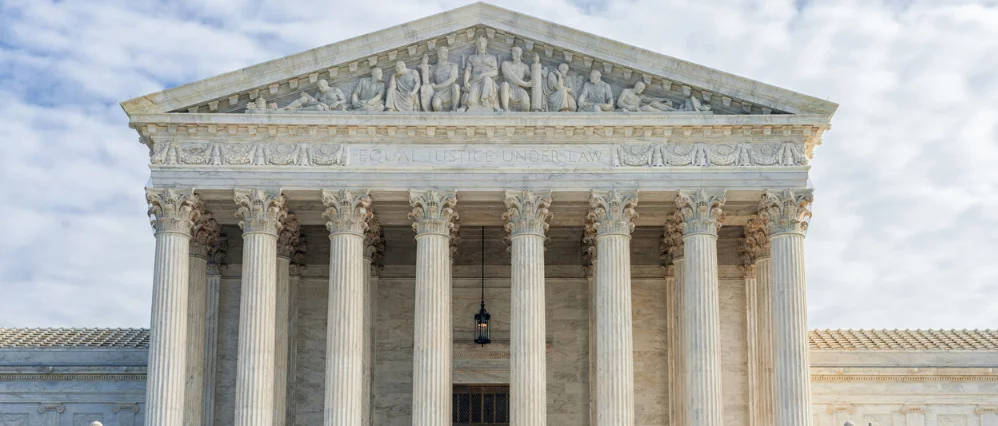Overview
Employment Appeals Are In Our Roots
Constangy lawyers have been defending employers’ interests before appellate courts since the firm’s earliest days. In the 1950s and 1960s, led by firm founder Frank Constangy, the firm appeared before the U.S. Supreme Court 10 times. Our tradition of Supreme Court advocacy continued over the years, as recently as Hertz Corp. v. Friend, 559 U.S. 77 (2010), in which the Court adopted the “nerve center” analysis for diversity jurisdiction.
Constangy has represented employers in hundreds of cases before every circuit of the U.S. Court of Appeals (except the Federal Circuit, which does not hear labor and employment cases). In the past decade alone, our lawyers have appeared in approximately 150 federal appeals.
On the state level, Constangy has represented its clients before the Alabama, California, Florida, Georgia, Kentucky, Montana, North Carolina, Texas and Wisconsin Supreme Courts, in addition to the lower appellate courts in those and many other states.
What Sets Us Apart
Employment Law and Appellate Law are two of the most highly specialized areas of practice. Many states certify legal specialists in one or both areas. Our attorneys are both. Everyone on our Appellate Team adds years of focused appellate experience to their employment background. The Team includes state-certified specialists in both areas, and attorneys who are experienced in all of the major areas of employment litigation: traditional labor, equal employment opportunity, wage and hour, trade secrets, whistleblower and retaliation, worker’s compensation, workplace safety, employee benefits, and class and collective actions.
We approach every appeal with a unique perspective and special advantage: we don’t need to learn the pertinent law and policy considerations that are so crucial to crafting arguments for appellate judges—we already know them. We can focus on tailoring that knowledge to craft the best argument for your case. And because we are already intimately familiar with the legal terrain—the unresolved issues, the cutting-edge questions, the coming legislative developments—we understand not only where your case sits in that terrain, but where tomorrow’s case does as well. We understand that every appeal is an opportunity to shape the law that will control the next case and impact our clients’ business practices, and we act accordingly, in a cost-effective fashion.
What We Do
We handle appeals. We designate the record, craft briefs, and conduct oral arguments before state and federal supreme courts and courts of appeal. But that’s not all we do. We consult with trial lawyers while a case is underway—to help formulate legal arguments, strategize procedural moves, write dispositive motions, advise on the preservation of issues for appeal, and navigate the complex procedural thicket of post-trial motions.
But our work for clients starts even earlier than that. We are thought leaders in our respective employment law fields. We frequently speak at bar and continuing education events, and write for the national, regional and local legal press. These activities are just as much an opportunity to advocate for sound legal standards as is a brief or oral argument. It is a way to speak directly to judges (and legislators) about beneficial legal developments before a lawsuit is even filed.
Our work defending employers in appeals is just the “tip of the iceberg” of what we do to defend the interests of employers in the orderly development of employment law.
 Nationwide Appellate Reach
Nationwide Appellate ReachWe’ve argued before all 12 U.S. Courts of Appeals that hear employment cases, as well as multiple state supreme courts across the country.
 Supreme Court-Level Impact
Supreme Court-Level ImpactWe’ve argued cases before the U.S. Supreme Court and helped establish key precedent protecting employers’ interests.
 Seamless Trial Collaboration
Seamless Trial CollaborationWe partner with trial teams early to preserve issues and strengthen the foundation for appeal if necessary.
 Focused Appellate Experience in Employment Law
Focused Appellate Experience in Employment LawOur appellate team concentrates exclusively on labor and employment matters—delivering deep, strategic insight grounded in workplace law.
Experience
Matters
Constangy has represented employers in hundreds of cases before the U.S. Supreme Court, and every circuit of the U.S. Court of Appeals (except the Federal Circuit, which does not hear labor and employment cases). In the past decade alone, our lawyers have appeared in approximately 150 federal appeals.
On the state level, Constangy has represented its clients before the Alabama, California, Florida, Georgia, Kentucky, Montana, North Carolina, Texas and Wisconsin Supreme Courts, in addition to the lower appellate courts in those and many other states.
Among other things, Constangy’s advocacy in federal and state appellate courts has helped its clients:
- Establish nationwide uniform test for determining a corporation’s principal place of business for purposes of diversity jurisdiction. Hertz Corp. v. Friend, 559 U.S. 77 (2010).
- Defend college athletics’ “revered tradition of amateurism” against claims that student athletes should be paid to play sport in the Seventh and Ninth Circuits. Dawson v. Nat'l Collegiate Athletic Ass'n, 932 F.3d 905 (9th Cir. 2019); Berger v. Nat’l Collegiate Athletic Ass’n, 843 F.3d 285 (7th Cir. 2016).
- Reinforce an employer’s ability to terminate an employee based on conduct that “so clearly conflicted with the performance of her job duties” that it did not amount to protected activity under Title VII’s opposition clause. Gogel v. Kia Motors Mfg. of Ga., 967 F.3d 1121 (11th Cir. 2020) (en banc).
- Ensure workers are able to freely vote in union elections by overturning the certification of a union’s victory based on the National Labor Relations Board’s actions in potentially disenfranchising bargaining unit employees. Nat’l Hot Rod Ass’n v. NLRB, 988 F.3d 506 (D.C. Cir. 2021).
- Recover attorneys’ fees from the National Labor Relations Board due to its “bad faith” refusal to apply the established law of the governing circuit. Heartland Plymouth Court MI v. NLRB, 838 F.3d 16 (D.C. Cir. 2016).
- Defeat the state law claims asserted by skycaps challenging airlines’ imposition and retention of baggage-handling fees for curbside service, as the plaintiffs’ claims “intrude into a no-fly zone” demarcated by the Airline Deregulation Act’s preemption provision. Brown v. United Airlines, Inc., 720 F.3d 60 (1st Cir. 2013).
- Uphold the public’s right to participate in agency rule-making activities affecting employers by enjoining the U.S. Department of Labor’s reinstatement of regulations without providing notice or an opportunity for public comment. N.C. Growers Ass’n v. United Farm Workers, 702 F.3d 755 (4th Cir. 2012).
- Affirm the dismissal of class allegations in a matter involving wage and hour claims on jurisdictional grounds. Williams v. Impax Labs., 41 Cal. App. 5th 1060 (2019).
- Preserve federal diversity jurisdiction by affirming the dismissal of aiding-and-abetting claims against a fraudulently-joined individual defendant, affirm the entry of judgment on the pleadings due to employee’s failure to exhaust administrative remedies as to an alleged constructive discharge, and uphold the entry of summary of judgment on the remaining age-based hostile work environment claim. Henson v. Union Pacific RR Co., --- F.4th ---, 2021 WL 2829127 (8th Cir. 2021).
Additionally, Constangy attorneys have advanced employers’ interests by filing amicus briefs on behalf of industry associations and other business entities. The firm’s amicus filings have helped lead to favorable outcomes for employers, including:
- Before the Texas Supreme Court, a ruling that state common law claims based on conduct covered by the Texas Commission on Human Rights Act’s prohibition against sexual harassment are subject to the statute’s standards and procedures. Waffle House v. Williams, 313 S.W.3d 796 (2010).
- Before the Third Circuit, a ruling that plaintiffs’ discrimination claims under the Americans with Disabilities Act were not subject to class treatment, given the need for individualized inquiries into whether each class member is “disabled” or a “qualified individual with a disability” under the statute. Hohider v. United Parcel Serv., 574 F.3d 169 (3d Cir. 2009).
- Before the Georgia Supreme Court, a ruling construing the limitations periods for renewed worker’s compensation claims and reversing a ruling in an employee’s favor. Roseburg Forest Prods. Co. v. Barnes, 299 Ga. 167 (2016).
Attorneys
- Senior Counsel
- Office Managing Partner - Whistleblower & Retaliation Practice Group Co-Chair
- Associate Attorney
- Senior Counsel
- Office Managing Partner
- Office Managing Partner – EEO/Contractor Compliance, Reporting & Analytics Practice Group Co-Chair; Diversity, Equity & Inclusion Practice Group Co-Chair
- Associate Attorney
- Senior Counsel
- Associate Attorney
- Partner
- Partner - Appellate Practice Group Chair
- Partner
- Partner - Labor Relations Practice Group Co-Chair
- Of Counsel
- Senior Counsel
- Partner - ERISA Litigation Practice Group Chair
- Associate Attorney
- Partner
- Partner
- Partner
- Associate Attorney
- Office Managing Partner
- Partner
- Senior Counsel
- Partner
- Senior Counsel
- Partner
- Partner
- Partner






